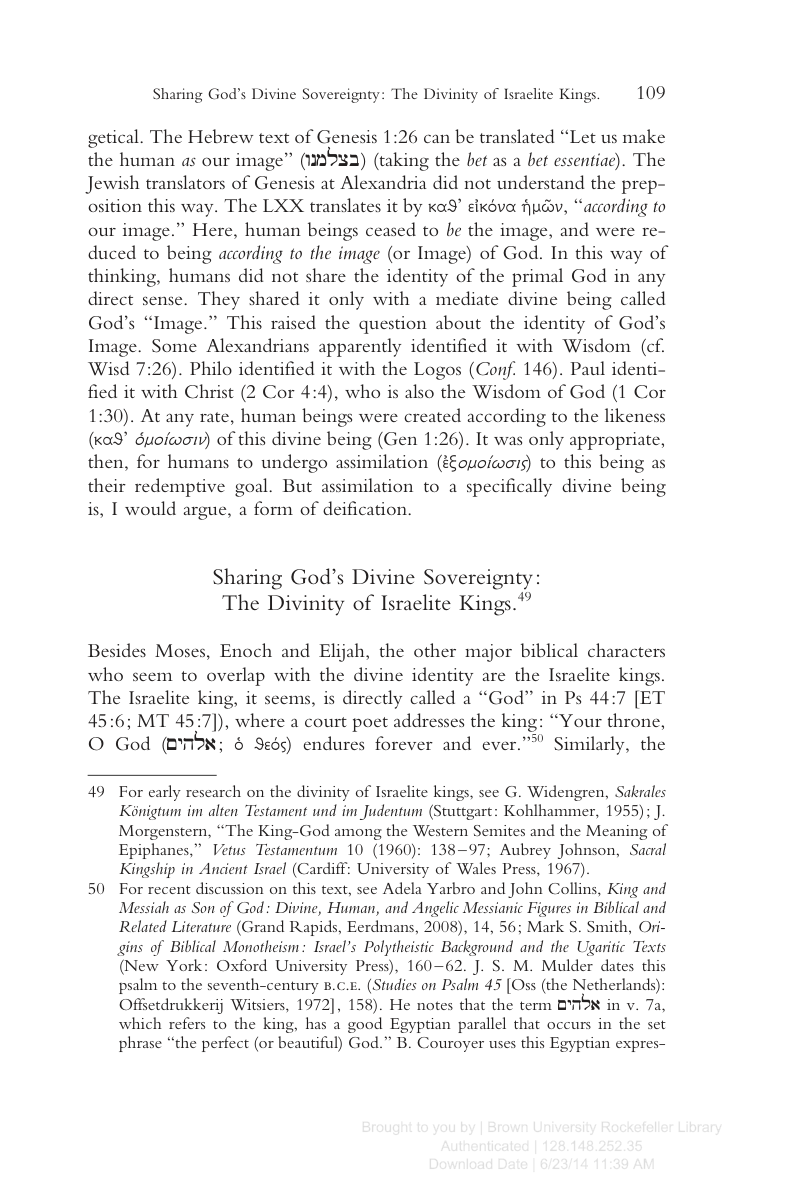M. David Litwa draws a parallel between the title "Everlasting Father" in Isaiah 9 to the Ancient of Days in Daniel 7.
- Type
- Book
- Source
- M. David Litwa Non-LDS
- Hearsay
- Secondary
- Reference
M. David Litwa, We Are Being Transformed: Deification in Paul's Soteriology (Beihefte zur Zeitschrift für die neutestamentliche Wissenschaft und die Kunde der älteren Kirche 187; Berlin: Walter de Gruyter, 2012), 109-11
- Scribe/Publisher
- Walter de Gruyter
- People
- M. David Litwa
- Audience
- Reading Public
- Transcription
Sharing God's Divine Sovereignty:
The Divinity of Israelite Kings
Besides Moses, Enoch and Elijah, the other major biblical characters who seem to overlap with the divine identity are the Israelite kings. The Israelite king, it seems, is directly called a "God" in Ps 44:7 [ET 45:6; MT 45:7]), where a court poet addresses the king: "Your throne, O God (אוהים; ο θεος) endures forever and ever." Similarly, the prophet Isaiah bestows the name "Mighty God" (אל גבור) on a future king (9:6). Influential in the mid 20th century, Sigmund Mowinckel translated "Mighty God" (אל גבור) as "Divine Hero," and commented: "the heroic power which the child will possess is characterized as divine. In form the name offers a precise parallel to the epithet applied to Aley-an-Baal in the Ugaritic texts: 'ilu gaziru, 'the victorious or heroic god'" (cf. also Deut 10:17; Jer 32:18; Neh 9:32; Ps 23[24]:8). R. A. Carlson prefers to relate the title "Mighty God" to the Assyrian title ilu qarrādu ("Strong God") which often appears. Hans Wilderberger, who keeps the translation "mighty God," confirms that it is a divine epithet. אל גבור is directly applied to YHWH in Isa 10:21 (LXX θεος ισχυων) and Jer 39[32]:18 (ο θεος ο μεγας και ισχυρος). That the Israelite king could be called "God" is less shocking in light of Ps 44:7 [ET 45:6]. Although this language is often explained (away) by Old Testament scholars by the idea that the Israelite king merely represents Yahweh on earth, bearing the name "God" seems to indicate a closer relation to Yahweh than representation.
Furthermore, the name "Everlasting Father" (אביעד), applied to the king in the same verse, most likely means "Father of Eternity" (cf. Father of Years," used of El at Ugarit, and "Ancient of Days" in Dan 7:9). It indicates, says Mowinckel, "the one who produces, directs, and is lord of the ever-changing years . . . who thus produces and directs 'eternity', the entire fullness of events and reality. It is evident that such a name really belongs to a god, and not just any god, but the god, 'the high god', 'the supreme god', 'the father of the gods,'" It is probably more accurate to conclude, however, that אביעד is a hyperbolic way of granting the king immortality. Hugo Gressmann already noted as parallels the Egyptian royal titles "prince of eternity," and "lord of unendingness." The additional implication of the king's immortality seems to have been understood by the psalmist who prays that the king may live as long as the sun endures (Ps 71[72]:5, LXX). Similarly, in Psalm 20:5 [ET 21:4], the king asks for life and Yahweh gives it to him, "length of days forever and ever" (cf. Ps 60:7 [ET 61:6]).
- Citations in Mormonr Qnas
The B. H. Roberts Foundation is not owned by, operated by, or affiliated with the Church of Jesus Christ of Latter-day Saints.

